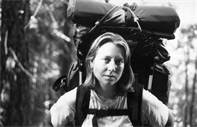So it was with an expansive sense of our own good fortune that we sat to listen to Cheryl Strayed’s keynote, maybe the most generous writer-to-writer talk I’ve ever heard.
Be ambitious, Strayed says, be wildly, even crazily ambitious, letting your hopes for your book be exactly as foolishly grand as hers were when she set out alone to hike the length of the Pacific Crest Trail. Be that brave, she said, even as you hold in your heart the certainty that you aren’t really brave, that you lack the courage to face even your own inevitable mediocrity.

Why? because each of us is profoundly, even fundamentally mediocre — this is Strayed’s perfect word — so it’s only by asking ourselves to do what we actually cannot yet do that we step up to take on the critical challenges that will be necessary.
Without risking failure nothing important can we written so we must settle down to the fact that we’re sure to fail, then fail, and then fail again. If there is one true task of a writer, she says, it is to take up a story that is too heavy, one too difficult to bear, shoulder it, then walk a thousand miles.
For her, as a young person and not yet recognizable as the inspiring writer she’d become, the burden was an insupportable grief over her mother’s early death: Time simply refused to ameliorate this loss and it lay like a giant tree across the pathway of her life. Despite the usual feints and dodges–sex, drugs, leaving college one short paper shy of graduation–she could find no way around it.
Realization came four years later as Strayed tried to stand while carrying a backpack very literally too heavy for her and ended with the pack on her back crouching on the floor on her hands and knees. This occurred in a motel room in the town of Mojave, California, on the morning she was to set out on her three-month trek, it was then she came to see what was patently obvious. She could not be expected to know what she was doing since she’d never been backpacking before!
For the ambitious novelist it is always this: you simply cannot write the book you’re writing because it is objectively too hard for you. It’s too long, for one thing, and its psychic weight’s too great. Techniques will be required and you’ve mastered none of them.
You can’t write this book because you don’t know how and you cannot, in fact, know how because this book of yours — if original — has never before been written, not by you, not by anyone.
It is in the book-length narrative that our most god-like and grandiose ambitions slam into the humbling knowledge of how spectacularly bad we are as writers. (Who do you think you are? my semi-drunken half-lit self used to sneer in the bathroom mirror: William Shakespeare?)
But, yes, we must set out to be Shakespeare, needing to accomplish what feels impossible, first telling some huge story that you don’t yet even know, telling that long story long, going over its occurrences in excruciating detail, only then to discover — when you have a draft — out how bad it frankly is. And it’s right abut there the writing of the book you wanted to write will most likely begin.
It is in setting out to do the impossible thing that we will accustom ourselves to failure, feel every scrape, bruise, blister, all the aches and strains in every joint and muscle and tendon, pain borne of huge ambition. And so we remain ambitious even as we’re disheartened, all the while learning to tolerate the reeking stench of our own not-great writing.
And the true horror is no one can hear so exquisitely well writing that’s gone wrong but you, and a few other writers. We as writers become the listeners to stories who have what’s like perfect pitch that comes from our close readings of the great writers of all time. From the works of Sophocles to that of Stoppard, we’ve read intimately, from the other side of the page with a hyper-attentiveness that feels tactile, as if we’re reading in Braille, repeating the lines aloud to ourselves.
Reading for the writer is a full-body experience. And the writer does read in a different place in the mind, reading as a musician listens to music being played, each of us operating on what Aaron Copland has called the Compositional Plane. Any writer who does not read this way — haptically, experiencially, physically — who does not move in and begin to inhabit a story with complete conviction, might want to consider another mode of self- expression.
And because we’ve read great writers we know what full well what genius is. And we cannot be one of the first women now to have hiked the Pacific Crest Trail alone as a complete novice. That story of foolhardy bravery belongs to Cheryl Strayed.
And yes, as writers we will be required to overburden our own packs with all the weight of all that storytelling history, including the certain knowledge of how gifted, great, brave or innovative we can never hope to be. We have to learn to bear the unbearable, to challenge ourselves to go first, to step out and go it alone.
How else do you hear, in those first words strung together, the sound of your own voice sounding original?

